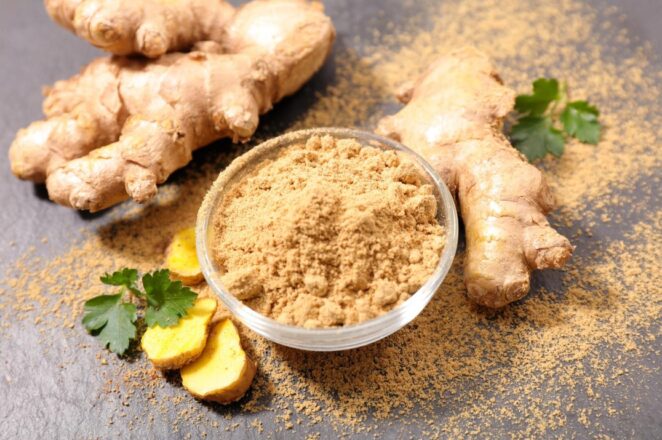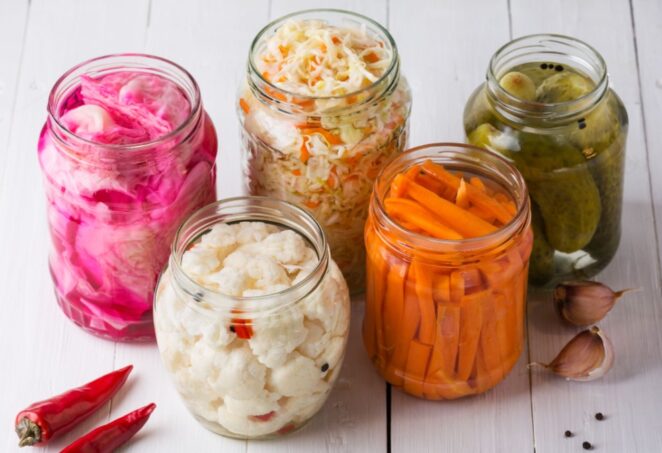Inflammation and immune health are at the center of overall well-being. Inflammation is a response in the body that helps it heal, however, chronic and unwanted inflammation can lead to fatigue, joint pain, and a weakened immune system. The good news?
Food plays a powerful role in keeping inflammation in check and strengthening immune defenses. By incorporating the right ingredients into daily meals, it’s possible to feel better, fight off illness more effectively, and improve long-term health.
Ginger Fights Inflammation and Strengthens Immunity
The benefits of ginger go far beyond adding a spicy kick to food and drinks. This root has been used for centuries in traditional medicine, and modern research backs up its ability to lower inflammation and boost immune function.
Ginger contains different compounds called gingerols and shogaols, which help calm the body’s inflammatory response. This makes it particularly useful for those dealing with chronic pain, joint stiffness, or conditions linked to inflammation. It also has antimicrobial properties that help fight infections, making it a smart addition during cold and flu season.
Incorporating ginger into meals is simple. Freshly grated ginger can be added to stir-fries, soups, and marinades. For a warming drink, ginger tea made with hot water and a squeeze of lemon is a comforting way to get its benefits. Smoothies also pair well with ginger’s slightly spicy flavor.

Turmeric can Really Make a Difference
Few foods have gained as much attention for their anti-inflammatory properties as turmeric. The bright yellow spice is packed with curcumin, a compound best known for its ability to reduce inflammation, ease joint pain, and support immune function.
One challenge with turmeric is that curcumin isn’t easily absorbed by the body. That’s why it’s often recommended to pair it with black pepper, which contains piperine—a compound that enhances absorption. Cooking with turmeric is an easy way to reap its benefits. It can be added very simply to roasted vegetables, soups, rice dishes, and even scrambled eggs for a warm, earthy flavor.
For those who struggle to get enough through food alone, turmeric supplements offer a more concentrated dose. These are especially helpful for people looking to manage chronic inflammation or joint discomfort. Whether through meals or supplements, making turmeric a daily habit can help the body fight inflammation and maintain a strong immune system.
Berries Fight Inflammation
Berries aren’t just a sweet treat—they’re one of the most powerful foods when it comes to reducing inflammation and protecting the immune system. Blueberries, strawberries, raspberries, and blackberries are loaded with antioxidants which help to neutralize many harmful free radicals in the body.
These antioxidants also play a key role in lowering oxidative stress, a major contributor to inflammation and chronic disease. They also support the immune system by enhancing the body’s ability to fight off infections.
Berries are incredibly easy to incorporate into meals. They can be eaten with oatmeal, yogurt, or even as a snack. Blending them into a homemade sauce for grilled meats or using them in salads adds a burst of flavor while delivering powerful anti-inflammatory benefits.

What About Nuts and Seeds?
Nuts and seeds pack a huge punch when it comes to fighting inflammation. Almonds, walnuts, flaxseeds, and chia seeds contain high levels of omega-3 fatty acids. These help to decrease inflammation throughout the body.
Walnuts, in particular, are known for their anti-inflammatory properties. They contain polyphenols that help combat oxidative stress and support brain function. Almonds are rich in vitamin E. This impacts immune health and protects cells from damage.
Chia and flax seeds offer the added benefit of fiber, which supports gut health, better balance, and helps regulate the body’s inflammatory response. These tiny seeds can be sprinkled on oatmeal, blended into smoothies, or added to homemade energy bars.
For an easy way to incorporate nuts and seeds into a daily routine, making a homemade trail mix or adding a spoonful of nut butter to toast or fruit is a delicious and satisfying option.
Fermented Foods Help Fight Inflammation
Fermented foods including yogurt, sauerkraut, kimchi, and kefir, are packed with probiotics—beneficial bacteria that help balance the gut microbiome.
A well-balanced gut microbiome supports the immune system by preventing different harmful bacteria from taking over and triggering inflammatory responses. Probiotics also help the body absorb nutrients more efficiently, ensuring that anti-inflammatory foods provide maximum benefits.
Incorporating fermented foods into meals can be as simple as putting a spoonful of sauerkraut on a sandwich, enjoying yogurt with fresh fruit, or using kimchi as a flavorful topping for rice bowls. Kefir, a fermented dairy drink, can be blended into smoothies or enjoyed on its own.
Maintaining a strong gut microbiome doesn’t just help with digestion—it plays a major role in keeping inflammation in check and supporting long-term health.

Leafy Greens Reduce Inflammation Markers
Leafy greens such as spinach, kale, arugula, and Swiss chard provide essential nutrients that help suppress inflammation. They contain high levels of antioxidants, vitamin C, and polyphenols that reduce markers linked to chronic inflammation.
Research shows that eating more greens lowers C-reactive protein levels—a sign of inflammation in the blood. These vegetables also offer magnesium, which plays a role in immune regulation.
Steamed kale, sautéed spinach, or fresh green salads with lemon juice and olive oil offer simple ways to add these to any meal. A green smoothie in the morning can supply a strong anti-inflammatory boost right at the start of the day.
Simple Hydration Strategies That Matter
Dehydration adds stress to the body and can increase inflammation. Water helps flush toxins and keeps cells functioning properly. Staying hydrated is one of the most overlooked ways to support immune function.
Try these simple strategies:
- Start the day with a glass of water before coffee or breakfast.
- Add lemon, cucumber, or mint to your water for extra nutrients.
- Eat water-rich foods like cucumbers, oranges, and watermelon.
- Drink herbal teas like rooibos or peppermint to stay hydrated.
- Keep a water bottle on your desk or bag to encourage frequent sips.
Even mild dehydration makes it harder for the body to detox. A steady water intake supports healing and immunity.

Vitamin D Foods Help Stabilize Immunity
Vitamin D supports both immune regulation and inflammation control. A deficiency in vitamin D is linked with increased risk for infections and autoimmune flare-ups.
Fatty fish like salmon and sardines are excellent food sources. Eggs and fortified dairy also offer smaller amounts. Mushrooms exposed to sunlight provide plant-based vitamin D.
People who don’t get enough sun exposure or live in cloudy regions often need food-based support or supplements. Adding salmon to meals twice a week can help maintain healthy vitamin D levels. For plant-based eaters, fortified oat milk or vitamin D drops are an alternative.
Final Food Swaps That Make a Big Difference
Some everyday food choices quietly fuel inflammation. Replacing them with better options can support immunity fast.
Try these swaps:
- Replace sugary cereals with oatmeal and fresh fruit.
- Switch white bread with 100% whole grain alternatives.
- Choose olive oil instead of vegetable oil for cooking.
- Replace processed snacks with raw nuts or dried berries.
- Swap soda for unsweetened herbal tea or infused water.
These simple swaps remove inflammatory triggers while increasing nutrient intake. Over time, better choices lead to stronger immune defense.

Conclusion
Food is not just fuel—it’s your body’s best defense tool. Ginger, turmeric, berries, and leafy greens work hard beneath the surface to repair, protect, and energize your system. Nuts and fermented foods bring balance to digestion and immunity. Water and vitamin D close the loop.
Eating with intention doesn’t mean restriction. It means choosing what helps you thrive and cutting out what holds you back. Every bite has power. Use it wisely.



